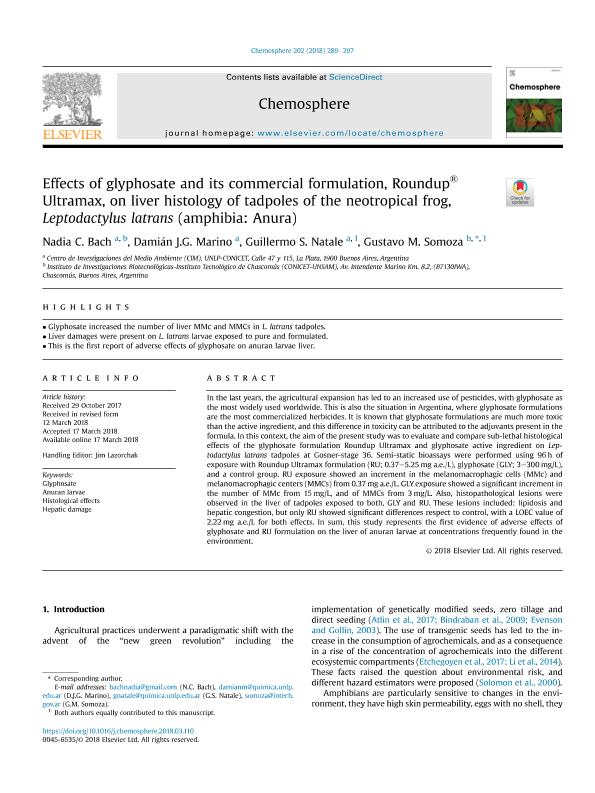Mostrar el registro sencillo del ítem
dc.contributor.author
Bach, Nadia Carla

dc.contributor.author
Marino, Damian Jose Gabriel

dc.contributor.author
Natale, Guillermo Sebastian

dc.contributor.author
Somoza, Gustavo Manuel

dc.date.available
2019-10-09T17:53:05Z
dc.date.issued
2018-07
dc.identifier.citation
Bach, Nadia Carla; Marino, Damian Jose Gabriel; Natale, Guillermo Sebastian; Somoza, Gustavo Manuel; Effects of glyphosate and its commercial formulation, Roundup® Ultramax, on liver histology of tadpoles of the neotropical frog, Leptodactylus latrans (amphibia: Anura); Pergamon-Elsevier Science Ltd; Chemosphere; 202; 7-2018; 289-297
dc.identifier.issn
0045-6535
dc.identifier.uri
http://hdl.handle.net/11336/85465
dc.description.abstract
In the last years, the agricultural expansion has led to an increased use of pesticides, with glyphosate as the most widely used worldwide. This is also the situation in Argentina, where glyphosate formulations are the most commercialized herbicides. It is known that glyphosate formulations are much more toxic than the active ingredient, and this difference in toxicity can be attributed to the adjuvants present in the formula. In this context, the aim of the present study was to evaluate and compare sub-lethal histological effects of the glyphosate formulation Roundup Ultramax and glyphosate active ingredient on Leptodactylus latrans tadpoles at Gosner-stage 36. Semi-static bioassays were performed using 96 h of exposure with Roundup Ultramax formulation (RU; 0.37–5.25 mg a.e./L), glyphosate (GLY; 3–300 mg/L), and a control group. RU exposure showed an increment in the melanomacrophagic cells (MMc) and melanomacrophagic centers (MMCs) from 0.37 mg a.e./L. GLY exposure showed a significant increment in the number of MMc from 15 mg/L, and of MMCs from 3 mg/L. Also, histopathological lesions were observed in the liver of tadpoles exposed to both, GLY and RU. These lesions included: lipidosis and hepatic congestion, but only RU showed significant differences respect to control, with a LOEC value of 2.22 mg a.e./L for both effects. In sum, this study represents the first evidence of adverse effects of glyphosate and RU formulation on the liver of anuran larvae at concentrations frequently found in the environment.
dc.format
application/pdf
dc.language.iso
eng
dc.publisher
Pergamon-Elsevier Science Ltd

dc.rights
info:eu-repo/semantics/openAccess
dc.rights.uri
https://creativecommons.org/licenses/by-nc-sa/2.5/ar/
dc.subject
ANURAN LARVAE
dc.subject
GLYPHOSATE
dc.subject
HEPATIC DAMAGE
dc.subject
HISTOLOGICAL EFFECTS
dc.subject.classification
Biología Reproductiva

dc.subject.classification
Ciencias Biológicas

dc.subject.classification
CIENCIAS NATURALES Y EXACTAS

dc.subject.classification
Ciencias Medioambientales

dc.subject.classification
Ciencias de la Tierra y relacionadas con el Medio Ambiente

dc.subject.classification
CIENCIAS NATURALES Y EXACTAS

dc.title
Effects of glyphosate and its commercial formulation, Roundup® Ultramax, on liver histology of tadpoles of the neotropical frog, Leptodactylus latrans (amphibia: Anura)
dc.type
info:eu-repo/semantics/article
dc.type
info:ar-repo/semantics/artículo
dc.type
info:eu-repo/semantics/publishedVersion
dc.date.updated
2019-09-27T14:31:00Z
dc.journal.volume
202
dc.journal.pagination
289-297
dc.journal.pais
Estados Unidos

dc.description.fil
Fil: Bach, Nadia Carla. Consejo Nacional de Investigaciones Científicas y Técnicas. Centro Científico Tecnológico Conicet - La Plata. Instituto de Investigaciones Biotecnológicas. Instituto de Investigaciones Biotecnológicas "Dr. Raúl Alfonsín" (sede Chascomús). Universidad Nacional de San Martín. Instituto de Investigaciones Biotecnológicas. Instituto de Investigaciones Biotecnológicas "Dr. Raúl Alfonsín" (sede Chascomús); Argentina. Universidad Nacional de La Plata. Facultad de Ciencias Exactas. Departamento de Química. Centro de Investigaciones del Medio Ambiente; Argentina
dc.description.fil
Fil: Marino, Damian Jose Gabriel. Universidad Nacional de La Plata. Facultad de Ciencias Exactas. Departamento de Química. Centro de Investigaciones del Medio Ambiente; Argentina. Consejo Nacional de Investigaciones Científicas y Técnicas. Centro Científico Tecnológico Conicet - La Plata; Argentina
dc.description.fil
Fil: Natale, Guillermo Sebastian. Universidad Nacional de La Plata. Facultad de Ciencias Exactas. Departamento de Química. Centro de Investigaciones del Medio Ambiente; Argentina. Consejo Nacional de Investigaciones Científicas y Técnicas. Centro Científico Tecnológico Conicet - La Plata; Argentina
dc.description.fil
Fil: Somoza, Gustavo Manuel. Consejo Nacional de Investigaciones Científicas y Técnicas. Centro Científico Tecnológico Conicet - La Plata. Instituto de Investigaciones Biotecnológicas. Instituto de Investigaciones Biotecnológicas "Dr. Raúl Alfonsín" (sede Chascomús). Universidad Nacional de San Martín. Instituto de Investigaciones Biotecnológicas. Instituto de Investigaciones Biotecnológicas "Dr. Raúl Alfonsín" (sede Chascomús); Argentina
dc.journal.title
Chemosphere

dc.relation.alternativeid
info:eu-repo/semantics/altIdentifier/url/https://www.sciencedirect.com/science/article/pii/S0045653518305277
dc.relation.alternativeid
info:eu-repo/semantics/altIdentifier/doi/http://dx.doi.org/10.1016/j.chemosphere.2018.03.110
dc.relation.alternativeid
info:eu-repo/semantics/altIdentifier/url/http://www.iib.unsam.edu.ar/archivos/papiros/Bach2018.pdf
Archivos asociados
